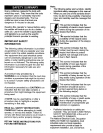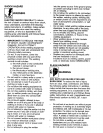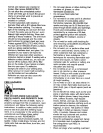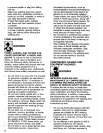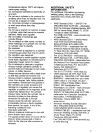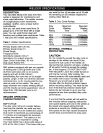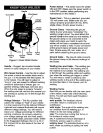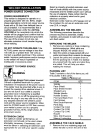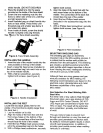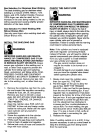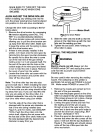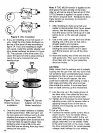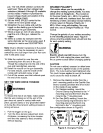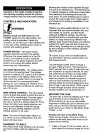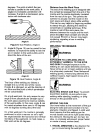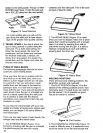
shield handle. (DO NoT DISCARDT)
2. Place the shaded lens into the space
provided on the inside of the face shield.
3. Screw the lens retaining nuts into the
holes to either side of the lens until they
are tight against lens.
4. Insert threaded peg on shield handle into
hole on face shield. Press firmly until
threaded peg and smaller peg below it
are locked into place.
5. From inside of shield, screw the shield
handle nut tightly onto peg threads.
See F_ur e 2 for face shield assembly.
Figure 2. Face Shield Assembly
INSTALLING THE HANDLE
1. Insert the tabs of the welder handle into the
slots provided on the top of the welder.
2. Insert a large flat head screw (included in
the accessories bag) into each hole on the
top of the welder handle.
3. With a flat tip screwdriver, securely
tighten both screws. (see Figure 3)
1 1
! I
Figure 3. Handle Installation
INSTALLING THE FEET
Locate the two black plastic feet for the
welder. (The front foot is slightly larger than
the back foot.)
1. Lay the welder on its side.
2. Align the holes of the front foot with the
front screw holes on the bottom of the
welder. The curved face of the front foot
should face the front of the welder.
3. Insert the two Phillips head screws (includ-
ed in the accessories bag) into the holes.
4. With a Phillips head screwdriver, securely
tighten both screws.
5. Align the holes of the back foot with the
rear screw holes on the bottom of the
welder. The curved face of the back foot
should face the rear of the welder.
6. Insert the two Phillips head screws
(included in the accessories bag) into the
holes.
7. With a Phillips head screwdriver, securely
tighten both screws. (see Figure 4)
I- I
I 1
Figure 4. Feet Installation
SELECTING SHIELDING GAS
The shielding gas plays an extremely
important role in the MIG welding process. It
is critical that the molten weld puddle be
shielded from the atmosphere. The shielding
gas creates a protective pocket around the
weld puddle which keeps impurities in the air
from infecting the weld. Inadequate shielding
will result in porous, brittle welds.
Although there are many gasses and gas
mixtures available for MIG welding, the
following recommendations are based on the
electrical output characteristics and metal
thickness capabilities of this specific
MIG welder.
Gas Selection For Steel Welding With
Steel Wire
For either mild or low carbon (High Strength
Structural) steel, use a gas mixture of 75%
Argon and 25% Carbon Dioxide. DO NOT
USE Argon gas concentrations higher than
75% on steel. The result will be extremely
poor penetration, porosity, and brittleness
of weld.
This gas mixture helps to prevent burn
through and distortion on very thin steel yet
provides good penetration on thicker steel.
Its ability to minimize spatter results in clean,
smooth weld appearances. In addition, it
provides good puddle control when welding
vertically or overhead.
11



